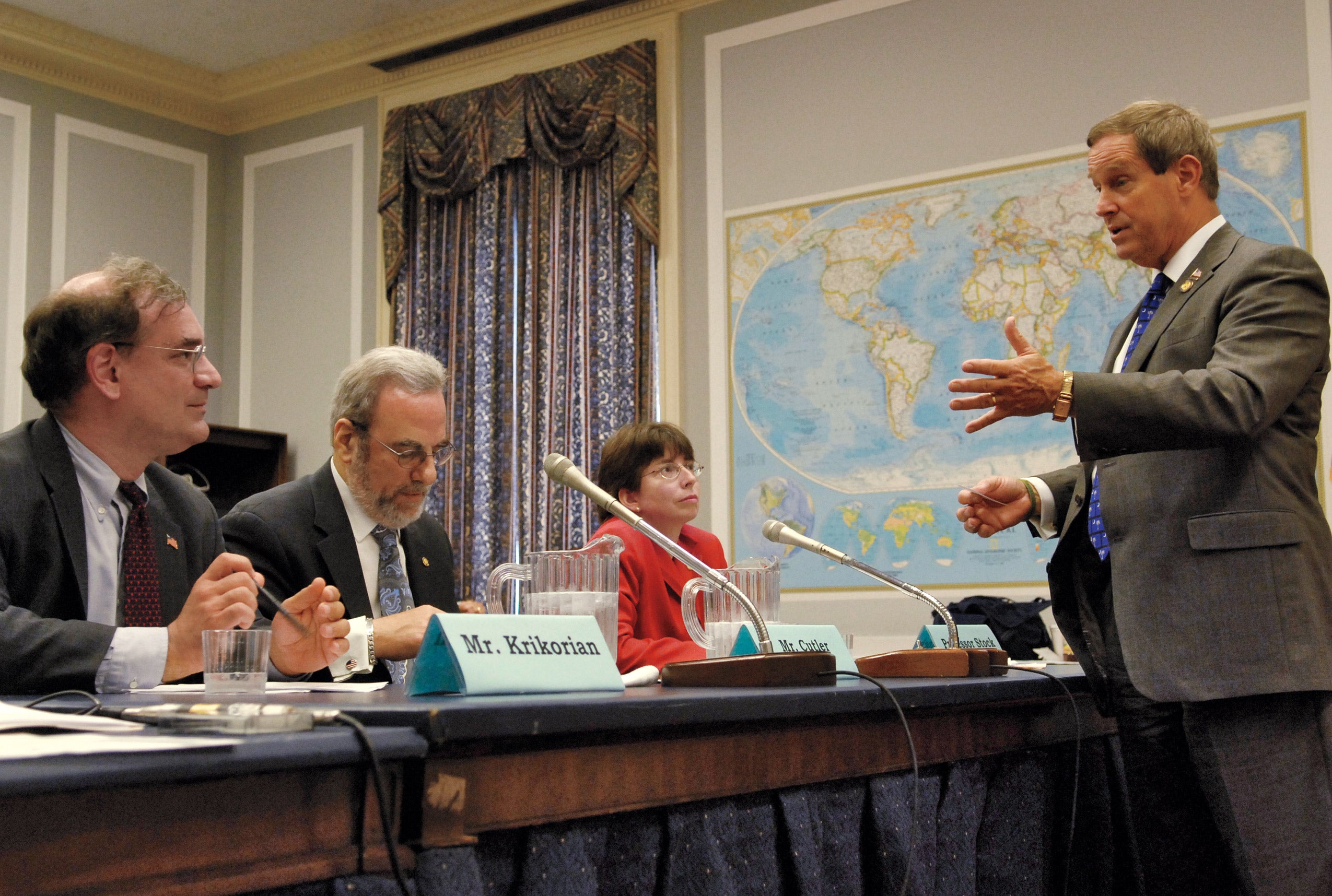When Margaret Stock ’92 was young, her great-grandfather, an Army veteran of the Philippine-American War and World War I, lived at her house in Wellesley, Mass. She used to go through his military memorabilia with him—awards, a mirror he’d used in the trenches, and a census record of his unit in the Philippines. This census, which showed that about 15 percent of his unit was from other countries—Russia, Italy, Ireland, Mexico, Germany—would turn out to be a seed for her work on immigration and the military, work that was recently recognized by the MacArthur Foundation with a “genius” grant. “I was struck by the number of immigrants in his unit. It was something I tucked away in the back of my mind,” Stock said, during a phone interview from her office in Anchorage, Alaska.
That piece of knowledge came in handy years later. Five years after 9/11, the U.S. military was fighting two wars and struggling to find qualified recruits, yet was turning away highly qualified immigrants who wanted to join the military as a quicker path to citizenship than the 10- to 15-year wait required to get a green card. Stock was part of the Army Reserve and taught at West Point. In Alaska, she had built a practice as an immigration lawyer, focusing partly on the effects of immigration law on military personnel. She knew that during times of war, the military was allowed by law to recruit immigrants and had done so for every war up through Vietnam. But everyone seemed to have forgotten about this loophole. “It was almost like everyone had amnesia,” she said. She also knew that the military was particularly desperate for soldiers with certain skills, such as the ability to speak foreign languages fluently, and was spending a lot of money on language training. Yet there was a pool of immigrants with exactly these skills waiting to be recruited. Stock saw the U.S. immigration system as an ever-more-intimidating bureaucracy, more focused on kicking people out of the country than on letting in the many skilled immigrants who want to be here.
Stock came up with the idea for MAVNI (Military Accessions Vital to the National Interest), a program that would provide an express lane for about a thousand people a year out of the many more caught up in the gridlocked immigration system. In meetings with everyone from the secretary of the Army to a group brought together to think through the crisis in military recruiting, Stock pointed out that the law allowing them to bring immigrants into the military already existed; they just had to dust it off: “Nobody had looked at the law—nobody paid any attention to it—so I’m the one who put the law together and said, ‘Look, here’s the law. You guys can meet this critical shortage. You don’t have to go to Congress. It just takes a memo.’ It just looked blindingly obvious to me.” She recalls that she ran it by a mentor who had once worked high up at the Pentagon, and he told her it was a great idea, but that the Pentagon “crushes great ideas.” If she managed to get it through at all, he told her, it would take at least five years. Stock got it through in less than 12 months.

Retired Lt. Gen. Benjamin Freakley, who was in charge of military recruiting and worked with Stock on MAVNI, pointed out that Stock had the rare dual ability of conceptualizing a program and planning its implementation from A to Z. “She’s a great leader and a changemaker,” he said. “Often people have a great policy idea, but they don’t know how to get it pushed through. She had the ability to see it through. And she made a cohesive argument because she could see the benefits to the individual, and to the nation.”
The program allows each branch of the military to recruit immigrants who are in the U.S. under temporary visas and who possess essential language or medical skills. The recruits on average score significantly better on tests and have higher levels of educational attainment and much lower attrition rates than their peers outside the MAVNI program. “The quality for this population is off the charts,” Lt. Col. Pete Badoian told The New York Times in 2010.
In creating MAVNI, Stock was able to cut through the copious red tape of both the immigration system and the Pentagon to find an elegantly simple solution that hadn’t occurred to anyone else. And she’s found similarly elegant solutions to two other problems at the intersection of immigration and the military. After creating MAVNI, Stock became known as one of the few people within the military who had an in-depth knowledge of immigration law. People would call her, email her, stop by her office, “pleading and begging for help with their cases,” she said. Some were soldiers’ family members, who were not themselves citizens and faced deportation after their spouse or parent was deployed. She recognized an unmet need but didn’t have the bandwidth to take on the cases herself. So she called the president of the American Immigration Lawyers Association and suggested they start a military assistance program matching lawyers with service members, their families and veterans who need pro bono representation. Since the program’s founding in 2008, 375 lawyers have provided counsel in almost 700 immigration cases.
When the Department of Homeland Security came under fire for the slow pace of military naturalizations, Stock suggested that naturalizations for legal immigrants be integrated into the basic training timetable, speeding up the processing time. The program was implemented in 2009. In a recent interview, Clinical Professor Deborah Anker LL.M. ’84, who taught Stock immigration law at Harvard, pointed out that few others share Stock’s knowledge of law, immigration and the military, suggesting that this helps her former student see things that others miss: “She has really developed this area of law. She thinks for herself; she does not fit into a mold.”

Stock had her first brush with immigration law by chance, while a student at the law school. (She first came to Harvard as an undergraduate. During college, she joined the Reserve Officers’ Training Corps, and then served for three years as a military police officer in Fort Richardson, Alaska, before returning to Harvard.) In her third year at HLS, she suddenly had a gap in her schedule after a course was canceled, and she picked a class taught by Anker. She was struck by how passionate Anker was about the subject, but also by how complicated immigration law seemed to be. “It scared me. I was left thinking this was not an area of the law I wanted to practice in,” she said.
After graduation, Stock got married; returned to Alaska, where she’d met her husband; and started working for a law firm, planning to focus on tax law. Soon after she arrived, she was asked to take on what she was told would be a 10- t0 20-hour pro bono case, involving a green card holder who faced deportation for allegedly smuggling a Russian woman into Alaska. Immigration authorities had seized the man’s vehicle and left him by the side of the road to find his way back to Anchorage, hundreds of miles away. As Stock looked into the case, she decided the government had made a mistake and the man had been falsely accused. She became obsessed with the case, spending more than 400 hours on it and suing the government under the Freedom of Information Act to find out what had really happened. By the time the charges were dropped, Stock knew she wanted to be an immigration lawyer.
For more information, go to bit.ly/HIRC30event” float=”right”]Looking back, Stock realizes that immigration law appealed to the side of her that has always identified with the underdog. Her family struggled after her father died when she was a teenager, one of nine children. Stock dropped out of high school at 15, but thanks to high SAT scores and a guidance counselor who fought for her, she was able to go to college. These days, she is an attorney at Cascadia CrossBorder Law Group in Anchorage, where she works on a wide variety of immigration cases, from helping foreign executives acquire visas to representing “banished” veterans—former service members who have been deported. Stock has always done pro bono work, but the MacArthur grant has freed her up to do even more. Recently she won a case for a man who had been trying for 10 years to get recognized as a citizen. (He was born in the Philippines to a father who was a U.S. citizen, and came to live with him in the U.S. as a teenager. After the Child Citizenship Act of 2000, he became a U.S. citizen automatically, but immigration authorities incorrectly denied his citizenship because he’d been born out of wedlock.) “This is a guy who is working a minimum-wage job with two kids,” Stock said. “And he couldn’t get his own government to recognize that he’s an American.”
Stock has been spending time in Washington, D.C., advocating for legislation that would repair and simplify U.S. immigration policies as a whole. And she travels around the country giving presentations, based on her experience with MAVNI.
“Nobody can get green cards anymore,” she said, “so these smart, highly educated people, people with Harvard and MIT degrees, [are] saying, ‘I’ll serve in the Army for four years, because then I’ll get American citizenship. Otherwise, I’m looking at a 20-year track.’”
The “genius” of the program, she said, “is that it capitalizes on the dysfunction of the legal immigration system.” But what Stock argues for above all is creating a functional system in the United States that will benefit immigrants as well as the country where they’re hoping to bring their talents.
